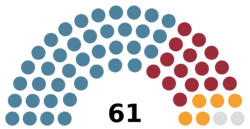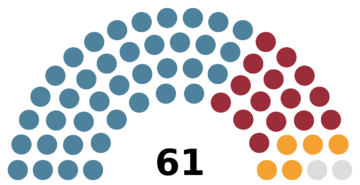Congress of Mava
Parliament of the Republic of Mava Kausaakkavtaagik Maava Yakiinaigaalu | |
|---|---|
| 50th Parliament of Mava | |
 | |
| Type | |
| Type | |
| History | |
| Founded | 1 April 1925 |
| Preceded by | Legislative Council of Mava |
| Leadership | |
President | Vauta Laumaasi, Independent[a] since 11 January 2023 |
Deputy President | Aamikat Uuyukluq, Labour Movement since 11 January 2023 |
| Structure | |
| Seats | 61 |
 | |
Political groups | Government (39)
Opposition (22)
|
Length of term | 2 years |
| Elections | |
| First-past-the-post | |
First election | 7 May 1925 |
Last election | 11 May 2023 |
| Meeting place | |
 | |
| kausaakkavtaagikakitat | |
| Website | |
| www.kausaakkavtaagikakitat.mv (Mavean) www.parliament.mv (Anglish) | |
| Constitution | |
| Constitution of Mava | |
| Footnotes | |
| |
 |
|---|
| This article is part of a series on the politics and government of Mava |
|
The Parliament of the Republic of Mava (Mavean: Kausaakkavtaagik Maava Yakiinaigaalu ) is the democratically-elected legislature of Mava. Located in Paas, it comprises 61 members known as Members of Parliament (Mavean: kausaakkavtaagikmaakaat; KM), who are elected to represent individual geographical constituencies by the plurality system. In accordance with the Constitution, legislative power is vested in the Parliament as the supreme representation of the Mavean people, with executive power shared with the government. The most recent parliamentary election was held on 11 May 2023, with the Progressive Party of the Mavean Islands winning an outright majority.
Parliament is a unicameral body responsible for creating and amending all laws in Mava. It was founded in 1925 through the interim Mavean Independence Act and was permanently established in the 1925 Mavean Constitution. Between 1925 and 1994, Parliament was de facto bicameral, with a "Grand Committee of the Parliament" acting as a technocratic review body within the assembly. The committee was abolished by a constitutional amendment in 1993.
History
The Parliament of Mava was created on 1 April 1925 through the Mavean Independence Act, passed by the Atitlanese Congress. The members were carried over from the membership of the Legislative Council, which had served as the appointed advisory body to the colonial governor. Under the interim provisions, Mava was governed by a Transitional Government of the Parliament, appointed by Parliament to govern until elections could be held. The first elections were held on 14 May 1925, with Kuraava Tanigak appointed president by Parliament. The body was made permanent following the passage of the first Mavean constitution in September 1925.
The 1943 constitution radically increased the powers of parliament, transforming Mava from a presidential to a parliamentary republic. The prime minister, a member of Parliament, formally became head of government and answerable to Parliament rather than the president. Parliament also assumed powers to dismiss governments with the abolition of the assembly-independent system.
Under the 1943 constitution, the president of the parliament appointed a "Grand Committee of the Parliament", composed of elected members appointed for their knowledge and expertise. The committee was responsible for scrutinising bills passed by the wider house, recommending amendments, and presenting bills for promulgation. The body was abolished in 1994 to promote the equality of elected members and because it had become a largely rubber-stamp body, bills rarely receiving anything more than a brief review before presentation to the president.
Powers and role
Under the constitution, there is no legal or constitutional separation between the executive and legislative branches. The government is officially called the "Executive Committee of the Parliament" and derives its powers from Parliament. In practice, there is a separation of functions, although officially the government and parliament constitute one single corporation governed by the constitution and relevant laws.
The Parliament is constituted in the Constitution as the supreme representative body of the people of the Republic of Mava. It is convened in two sessions each year, the first session on the second Monday of January and the second session on the second Monday of September. Extraordinary sessions may be called by the President, the Prime Minister or by one-fifth of members.
The constitution and laws relating to Parliament provide for the following functions:
- Adopting, amending, or repealing enactments to the constitution;
- enacting, amending, or repealing statutory laws;
- approve the budget;
- elect the president;
- approve nominations for judicial offices and appointments to the Council of State;
- approving the nomination of the prime minister;
- hold the government to account;
- convene as a court of impeachment for trials of public officers;
- approve international treaties.
The president's role in the legislative branch is nominal. They summon and dissolve Parliament and formally open its sessions following an election. They may address its members and send messages to it. However, they are obliged (although not legally required) to sign laws passed in the Assembly; they may refer laws for judicial review, but this is rarely done.
Elections
General elections occur whenever Parliament is dissolved. Dissolutions occur automatically two years from the date of the first meeting of Parliament, although it is common for dissolutions to occur in March, at least six weeks prior to the date of the next election. Elections are usually held in the second week of May (generally a Thursday), following an electoral campaign of no less than 35 days. Candidates are usually nominated by political parties, although a small number of independent candidates have won seats. Candidates are usually elected in local party meetings in the relevant constituency, although the law does not mandate this and several candidates have historically been selected by the national party rather than local members.
Candidates are required to file a nomination paper bearing the signatures of at least 50 constituents. Each constituency returns one member of Parliament using the first-past-the-post electoral system, under which the winning candidate needs only the plurality of the vote instead of an outright majority. To stand as and vote for a candidate, one must be a Mavean citizen and at least eighteenth years of age. Additional eligibility requirements are imposed on electoral candidates.
Members serve a two year term. Should a member die, resign, or otherwise cease to hold their seat, a by-election is held in the relevant constituency under the same rules and procedures as in general elections. Individuals expelled by Parliament are not permitted to run in the following by-election, although they may be a candidate in the next general election (even if no subsequent by-election is held).
Constituencies
61 members are returned from multi-member constituencies or single-member constituencies. Each district is divided into a number of seats based on their population, each returning an allocated number of members. The distribution of constituencies is reviewed every ten years by the Mavean Elections Office.
| District | Seats | MPs |
|---|---|---|
| Aasqaalet | 2 | 11 |
| Miilep | 2 | 12 |
| Paas | 4 | 23 |
| Pmaak | 3 | 6 |
| Sigaak | 2 | 4 |
| Sittiyaa | 1 | 2 |
| Taagokiajut | 1 | 1 |
| Outer Islands | 1 | 2 |
The current set of constituency boundaries came into effect ahead of the May 2015 parliamentary elections. Prior to this, Paas had 6 seats, which were re-allocated to Aasqaalet and Pmaak.
2023 election
See also
- Politics of Mava
- Culture of Mava
Notes
External links
- Parliament of Mava. aawnuhiuakak.mv
